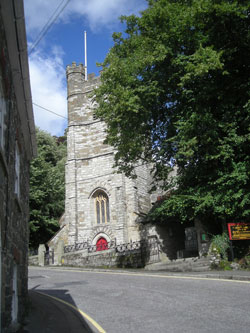
Feastday: May 3
Death: 6th century
Monastic founder and brother of St. Cadoc of Llancarfan, Wales. Gluvias labored in Cornwall, England, where he may have started an abbey. He is also called Glywys.
Human settlement in England
St Gluvias is a civil parish and settlement in Cornwall, England, United Kingdom. The village is now a suburb on the northern edge of Penryn which is two miles (3.2 km) northwest of Falmouth. The parish population at the 2011 census was 1,668.
Church history
The historic parish church of St Gluvias, dedicated to Gluvias of Cornwall (or Gluviacus) serves the Church of England parish of St Gluvias with Penryn. Gluvias of Cornwall was the son of Gwynllyw the warrior, King of Gwentlog, and a nephew of St Petroc. The church was founded in the 6th century and the parish was in the Middle Ages sometimes called Behethlan or Bohelland. In 1881 the church was in a dilapidated state and in need of thorough repair. It was rebuilt by J. P. St Aubyn in 1883 although the medieval tower survived and is built of blocks of granite. The church contains the brass of Thomas Kyllygrewe, c. 1485. There are also three wall-monuments of interest: Samuel Pendarves, d. 1693, and his wife; William Pendarves, d. 1671, and his wife (both are curiously positioned with the figures which should face each other on either side of the corners of a window opening); and J. Kempe, d. 1711, bust under drapery.
The Wesleyan missionary Benjamin Carvosso was born in this parish. Samuel Argall was buried here on 28 January 1626.
There are two Cornish crosses in the parish; one at Enys and one at Penryn. The cross at Enys was originally at Sancreed and was set up at Enys in 1848. The small cross at Penryn was once built into the fish market; when this was pulled down the cross was saved and resited near the town hall in 1895.
-

A former Methodist chapel at Laity Moor, now a Greek Orthodox church
-

The Cornish cross at Enys







